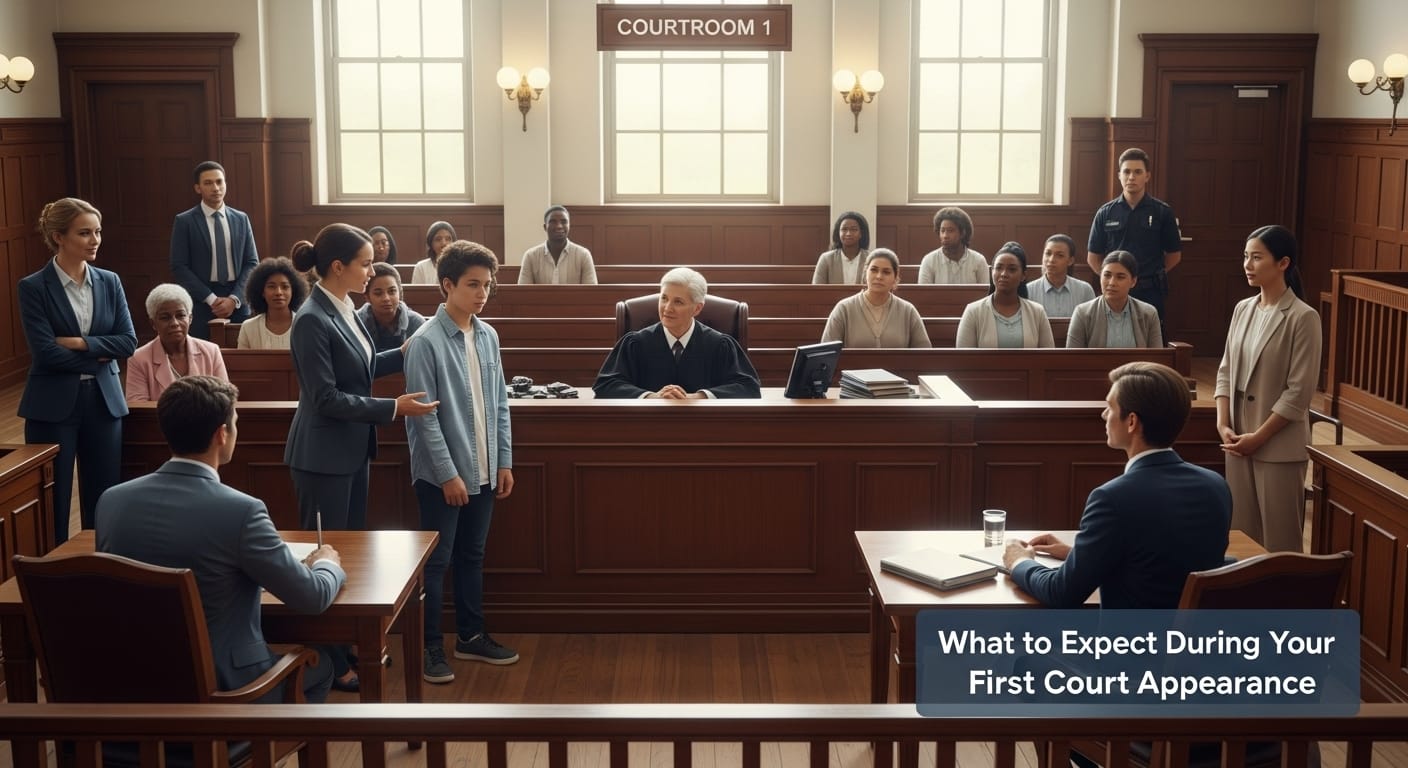So, you’ve finally received that dreaded court summons, and now you’re wondering what on Earth happens next. It’s like being invited to a party where you don’t know anyone, and the dress code is “formal but also slightly terrifying.”
Don’t worry; I’m here to guide you through your first court appearance with all the charm of a bad sitcom and just enough practical advice to keep you from panicking.

Top Takeaways and Key Concepts
Arrive Early and Prepared: Plan extra time to navigate the courthouse and pass security without stress.
Dress Appropriately: Wear formal, respectful attire to show seriousness and make a good impression.
Stay Calm in Waiting Areas: Use deep breaths and avoid distractions to manage anxiety before your case.
Present Your Case Clearly: Speak confidently, keep statements simple, and prepare any witnesses in advance.
Be Patient with the Verdict: Understand that decisions may take time; use waiting periods wisely.
Summary of This Article
The article provides a humorous yet practical guide for first-time court appearances, covering every stage from arrival to verdict. It explains how to navigate courthouse logistics, pass security, and manage nerves in waiting areas. Key advice includes dressing appropriately, preparing clear statements, and ensuring witnesses understand their roles. The piece emphasizes patience during deliberations and encourages staying calm throughout the process. Overall, it reassures newcomers that understanding procedures and maintaining composure are crucial for a successful first court experience.
Arriving at the Courthouse: The Great Adventure Begins

Let’s start with the big day itself. You wake up early, perhaps too early—like it’s Christmas morning and Santa forgot to leave presents. After wrestling with your outfit (seriously, who knew choosing between khakis or slacks could be so stressful?), you finally arrive at the courthouse.
Now, if you’ve never been there before, getting lost is practically a rite of passage! Look for signs that say “Courtroom” because wandering into the wrong room can lead to awkward encounters with people discussing their “unusual pet custody arrangements.” Trust me; it’s better to avoid those conversations.
When you walk in, take a moment to soak in the atmosphere. There are lawyers strutting around like they own the place (which they kind of do), and defendants looking as nervous as a cat in a room full of rocking chairs. Remember, everyone else is probably just as anxious as you are!
Security Check: Not Quite an Airport Experience
Next up is security—a process that feels more intense than boarding an airplane after 9/11. You’ll have to go through metal detectors and possibly endure some suspicious looks from security personnel who might think you’re hiding snacks in your pockets.
By the way, leave your phone in your car unless you want it confiscated faster than a kid sneaking candy into class! Once you’re through security, you’ll enter a world where cell phones are strictly prohibited—yes folks, it’s time for good old-fashioned human interaction.
Waiting Room Anticipation: The Calm Before the Storm
After making it past security unscathed (and without any embarrassing incidents), you’ll find yourself in the waiting area—a space filled with an eclectic mix of individuals who may or may not be planning their next heist. This is where nerves really kick in.
I remember my first time waiting for my name to be called; I felt like I was about to go bungee jumping without ever having tried it before! While sitting there, take deep breaths and try not to eavesdrop too much on other people’s conversations—it can get weird fast.
Interestingly enough, this waiting period gives you time to reflect on life choices—like why did I choose this legal battle? Should I have just let my neighbor’s cat use my yard?
Entering the Courtroom: Showtime!
Finally! It’s your turn! When your name gets called (it will sound official and probably echo), gather your courage like Thor wielding his hammer and march into that courtroom like you own it—at least until someone tells you otherwise.
The judge will be seated at the front looking very serious—almost like they’re judging whether or not you’ve chosen wisely at dinner last night.
As soon as everyone settles down, expect some formalities. You’ll hear phrases like “all rise” followed by everyone standing up as if they’ve been commanded by royalty—or maybe just someone who’s had too much coffee.
When it’s time for introductions, don’t panic! Just state your name clearly and confidently. If only we could all respond with something cool like “I am Batman,” but alas—the law doesn’t allow for superhero identities here!
Presenting Your Case: Speak Up!
Once things settle down again (and trust me; they will), it’s time for presentations—this is where nerves can hit harder than my aunt’s famous fruitcake during holiday dinners. Depending on whether you’re representing yourself or have hired an attorney, this part varies significantly.
If you’re flying solo, prepare what you’re going to say ahead of time—you don’t want blank stares when asked about key details related to your case! Keep things simple but clear; no one wants legal jargon unless it’s absolutely necessary (think explaining complex math concepts using only jellybeans).
And hey! If witnesses are involved (or even if they’re not), make sure they understand how important their roles are today—you want them ready and willing when called upon!
The Verdict: Waiting Game Continues
After both sides present their cases—and hopefully nobody throws anything—the judge will usually announce when they’ll deliver their decision later on. This might feel anticlimactic since there’s no immediate applause or confetti shower—but hang tight!
You may need another round of waiting while deliberations happen behind closed doors (cue suspenseful music). Use this time wisely by thinking about how great pizza sounds right now or contemplating life choices once more.
Eventually—the verdict arrives! Whether it’s good news or bad news, remember that every experience teaches us something valuable—even if what we learn is simply never entering another legal dispute again without proper preparation!
Conclusion: Surviving Your First Court Appearance
So there you have it—a beginner’s guide packed with insights sprinkled with humor about what awaits during your first court appearance. Sure, it’ll feel overwhelming at times—but honestly? Everyone goes through similar feelings at some point!
Just remember: stay calm, breathe deeply whenever anxiety creeps up unexpectedly (because let’s face it; courts can feel chaotic), lean on supportive friends/family members for encouragement—and most importantly? Treat yourself afterward because navigating legal waters deserves celebration!
Suggested Resources:
Understanding Court Procedures
https://www.nolo.com/legal-encyclopedia/understanding-court-procedures-32227.html
How Courts Work
https://www.courts.ca.gov/howcourtswork.htm
Your First Day in Court
https://www.lawhelp.org/resource/your-first-day-in-court
Frequently Asked Questions
What should I expect during my first court appearance?
You can expect security checks, waiting periods, and formal proceedings. Stay calm, listen carefully, and follow courtroom etiquette at all times.
How early should I arrive at the courthouse?
Arrive at least 30 minutes early to find parking, pass through security, and locate your courtroom without feeling rushed.
What should I wear to court?
Dress formally and respectfully. Business attire such as slacks, a collared shirt, or a conservative dress shows respect for the court.
Can I bring my phone into the courtroom?
Most courts prohibit phones inside the courtroom. Leave your phone in your car or turn it off and follow local court rules.
How should I behave while waiting for my case to be called?
Remain quiet, avoid distractions, and stay composed. Use this time to review your notes and calm your nerves before entering the courtroom.
What should I do when speaking to the judge?
Stand when addressing the judge, speak clearly and respectfully, and refer to them as “Your Honor.” Keep your statements brief and factual.
When will I receive the verdict after my hearing?
Some judges issue decisions immediately, while others take time to review evidence and deliver a verdict later. Be patient during this process.

Kevin Collier is a legal expert passionate about simplifying complex legal concepts for everyday individuals. With a focus on providing clear, practical information, he covers a wide range of topics, including rights, responsibilities, and legal procedures. Kevin aims to empower readers with the knowledge they need to navigate the legal landscape confidently, ensuring they can make informed decisions regarding their legal matters. Through insightful articles and easy-to-understand resources, he helps demystify the law, making it accessible to all.










